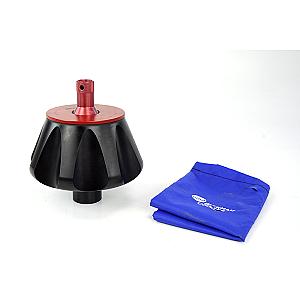The Beckman Coulter 70 Ti is a high-performance fixed-angle rotor designed for use in preparative ultracentrifuges of classes H, R and S. Capable of reaching speeds of up to 70,000 rpm, it generates a maximum centrifugal field of 504,000 × g, ideal for the separation of subcellular particles, viruses or sucrose gradients. Made of titanium, it offers a total capacity of 312 mL distributed over 8 cavities. Its robust design, built-in overspeed disc safety feature and compatibility with a wide range of tubes make it an indispensable tool in molecular and cellular biology.
70 Ti fixed-angle rotor - Good Condition





Offer Details
Accessories :
Beckman Coulter 70 Ti Fixed Angle Titanium Rotor 70,000rpm 8x39ml
Options :
7538
Description
70 Ti fixed-angle rotor: performance and reliability for intensive ultracentrifugation
The Beckman Coulter 70 Ti rotor is an iconic fixed-angle rotor model, renowned for its exceptional performance in ultracentrifugation. Designed specifically for the brand's H, R and S class preparative ultracentrifuges, this rotor embodies the precision and safety required for sensitive biomolecule separations or applications requiring complex gradients. Its name, "70 Ti", refers to its maximum rotation speed of 70,000 RPM and its main material: titanium, chosen for its light weight, mechanical strength and chemical compatibility.
The rotor has eight cavities that can accommodate different types of tubes, including Quick-Seal, OptiSeal, and thin- and thick-walled tubes. Each cavity is inclined at a fixed angle of 23°, ensuring efficient particle sedimentation. At full capacity, the rotor can process up to 312 mL of sample, making it particularly suitable for demanding protocols for the purification of viruses, cell organelles or protein aggregates.
The rotor design incorporates essential safety features. An overspeed detection disc, located at its base, is monitored by the centrifuge, which automatically stops the cycle if the speed exceeds 70,000 RPM, protecting both the user and the equipment. Buna N O-rings ensure optimal sealing, while the anodised aluminium lid is specially profiled to improve the centrifugal closing force. Four ventilation holes prevent internal overpressure in the event of accidental leakage, further enhancing safety during use.
The 70 Ti is a rotor designed to last. It is protected against corrosion by black polyurethane paint and requires regular, simple maintenance to ensure its longevity.
One of the great advantages of the 70 Ti is its versatility. It is compatible with a wide range of tubes, materials (polypropylene, polycarbonate, stainless steel, etc.) and formats ranging from 4 to 39 mL. These tubes can be used with standard or specific caps, such as titanium crimp-lock caps, ensuring their integrity even at full speed. Some tubes also require the use of spacer rings to ensure perfect symmetrical positioning in the rotor, which is essential to prevent imbalances.
The rotor fits perfectly into biosafety protocols. It can be cleaned, disinfected and even sterilised in an autoclave (121°C for one hour) without risk to its components, with the exception of certain plastic parts. Chemical decontamination procedures are also available for applications requiring a high level of sterility.
The 70 Ti is the benchmark choice for researchers and laboratories requiring precision, safety and maximum compatibility with modern ultracentrifugation methods.
Features
- Compatible with Beckman Coulter H, R and S class ultracentrifuges
- Tube angle of 23° for rapid sedimentation
- Wide compatibility with tubes and bottles of different materials and formats
- Robust titanium construction with black protective paint
- Anodised aluminium lid with ventilation holes to prevent overpressure
- Buna N O-rings for excellent sealing
- Integrated overspeed detection (photoelectric)
- Easy to maintain and clean
- Compatible with CsCl gradients (precautions described)
- Autoclavable (except for sensitive components)
- Enhanced safety for pathogenic samples (with sealed tubes and caps)
Technical Details
- Maximum speed: 70,000 rpm
- Maximum relative centrifugal force (RCF): 504,000 × g
- K factor: 44
- Number of cavities: 8
- Maximum capacity per tube: 39 mL
- Total rotor capacity: 312 mL
- Rotor material: titanium
- Rotor weight (loaded): approx. 9 kg
- Fixed angle: 23°
- Acceleration time (loaded): ~8.5 min
- Deceleration time (loaded): ~7 min
- Dimensions of largest compatible tube: 25 × 89 mm
- Safety system: optical overspeed disc 70,000 RPM
Compatible Accessories
- Rotor cover (Ref. 337923)
- Rotor handle (Ref. 337924)
- O-rings for handle and cover (Ref. 011757 and 870612)
- 70,000 RPM overspeed disc (Ref. 335585)
- Screwdriver tools for caps (screwdriver, torque wrench)
- Rotor cleaning kit (Ref. 339558)
- Recommended lubricants: Spinkote (Ref. 306812) and silicone grease (Ref. 335148)
- Compatible tubes: Quick-Seal, Open-Top, OptiSeal tubes, thin or thick-walled tubes made of polypropylene, polycarbonate, stainless steel, etc.
- Specific caps: standard aluminium, crimp-lock, screw caps, etc.
- Removal tools: for Quick-Seal, OptiSeal tubes and polycarbonate bottles